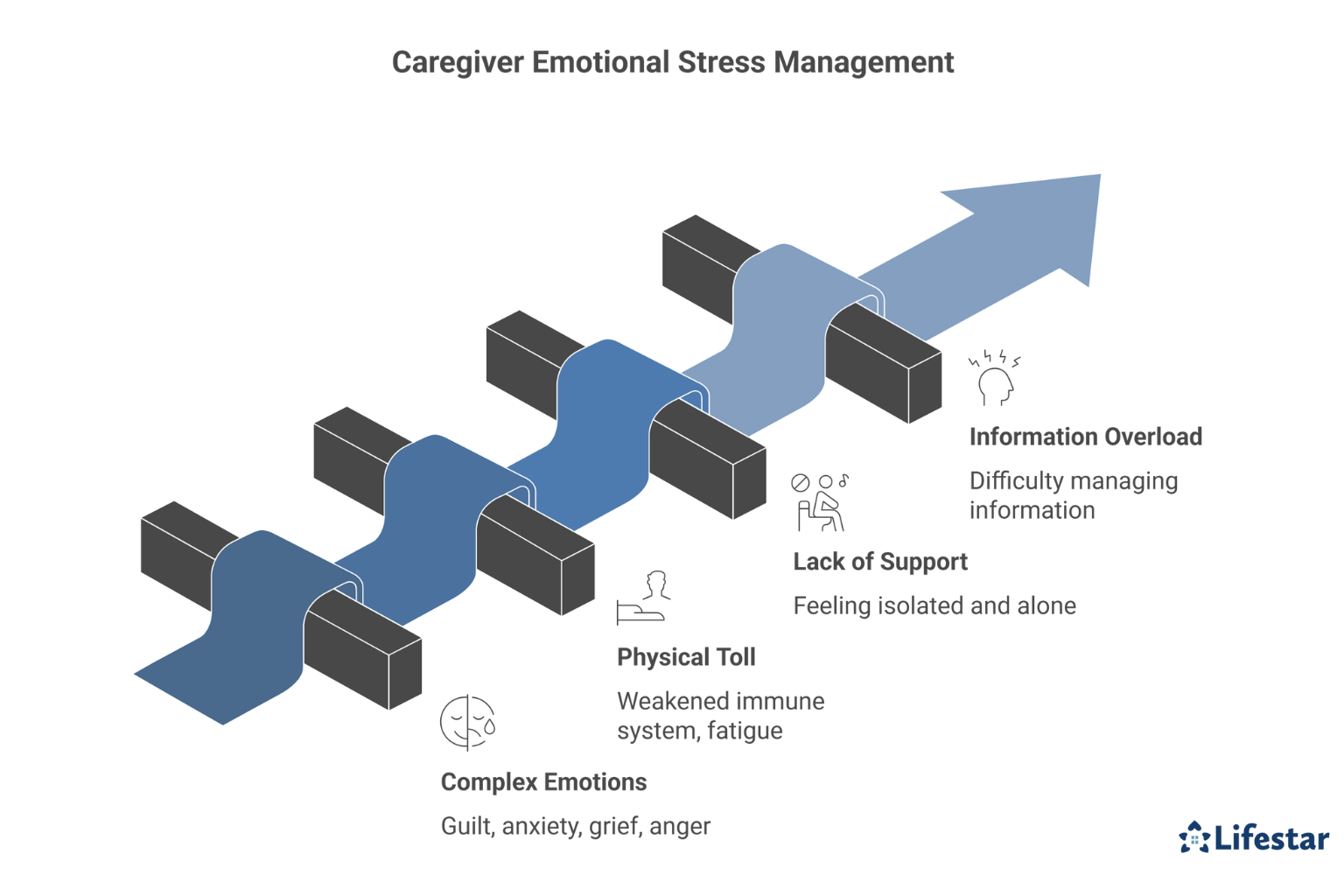
Table of Content
- 1 The Complex Emotions of Caregiving
- 2 The Physical Toll of Emotional Stress
- 3 Building Your Support Network
- 4 Professional resources:
- 5 Personal connections:
- 6 Practical Coping Strategies for Daily Life
- 7 Set realistic boundaries:
- 8 Practice self-care regularly:
- 9 Manage information overload:
- 10 Recognizing When You Need Professional Help
Caring for a senior loved one can be one of life’s most meaningful experiences, yet it often comes with unexpected emotional challenges. From overwhelming stress to feelings of isolation, caregivers frequently find themselves facing challenges to their own wellbeing while focusing on someone else’s needs.
The Complex Emotions of Caregiving
Caregiving triggers a wide range of emotions that can shift from day to day or even hour to hour. Many caregivers experience:
- Guilt – Feeling like you’re not doing enough or experiencing resentment
- Anxiety – Worrying constantly about your loved one’s condition and future
- Grief – Mourning the person your loved one used to be or the life you had before
- Anger – Frustration with the situation, healthcare systems, or even your loved one
- Loneliness – Feeling isolated from friends, family, and normal social activities
These feelings are completely normal and don’t make you a bad caregiver. Recognizing them is the first step toward managing your emotional health effectively.

The Physical Toll of Emotional Stress
Chronic caregiving stress doesn’t just affect your mind—it also impacts your body. Extended periods of emotional strain can lead to:
- Weakened immune system
- Sleep disturbances and fatigue
- Headaches and muscle tension
- Changes in appetite
- Increased risk of depression and anxiety disorders
When you’re constantly in “care mode,” your body remains in a heightened state of stress, which can have serious long-term health consequences if left unaddressed.
Building Your Support Network
Creating a strong support system is essential for maintaining your emotional wellbeing. Consider these approaches:
Professional resources:
- Contact local caregiver support groups.
- Speak with a counselor who specializes in caregiver stress.
- Explore respite care services in your area.
Personal connections:
- Reach out to family members who can share responsibilities.
- Maintain friendships through regular check-ins or brief visits.
- Join online communities for caregivers facing similar challenges.
Don’t wait until you’re overwhelmed to seek help. Building these connections early creates a safety net for difficult times.
The type of home care Oklahoma City seniors need can vary. Some need assistance a few hours a day, while others require more extensive around-the-clock assistance. At Lifestar Home Care, we tailor our care plans based on each senior’s individual care needs, and the plans can be adjusted at any time. We are a trusted provider of respite and 24-hour care, and we also offer specialized Alzheimer’s, dementia, Parkinson’s, and stroke care for seniors.
Practical Coping Strategies for Daily Life
Small consistent actions can make a significant difference in managing caregiver stress:
Set realistic boundaries:
- Learn to say no to additional requests when you’re at capacity.
- Delegate tasks to other family members or hired help.
- Accept that you can’t control every aspect of your loved one’s care.
Practice self-care regularly:
- Schedule brief breaks throughout the day, even if just for 10 minutes.
- Maintain activities you enjoy, whether it’s reading, walking, or listening to music.
- Prioritize basic needs like nutritious meals and adequate sleep.
Manage information overload:
- Limit time spent researching medical conditions online.
- Focus on reliable sources when you do need information.
- Discuss concerns with healthcare professionals rather than relying on internet searches.
Family caregivers need to care for their own wellbeing. If you’re caring for an aging loved one and are feeling overwhelmed, consider hiring a professional caregiver to provide Oklahoma City respite care. Families who want to prevent burnout can turn to Lifestar Home Care. One of our professional caregivers can assist your loved one at home while you take a nap, go to work, run errands, or go on vacation.
Recognizing When You Need Professional Help
Sometimes self-care strategies aren’t enough, and that’s okay. Consider seeking professional support if you experience:
- Persistent feelings of hopelessness or depression
- Panic attacks or severe anxiety
- Thoughts of harming yourself or others
- Complete loss of interest in activities you once enjoyed
- Inability to sleep or concentrate for extended periods
Mental health professionals can provide specialized coping strategies and, if necessary, medication to help you navigate this challenging time.
Whether you need respite from your caregiving duties or your aging loved one needs Oklahoma City live-in care, Lifestar Home Care can meet your family’s care needs. Our dedicated caregivers are available around the clock to provide transportation to doctor’s appointments, ensure seniors take their prescribed medications, and help with a variety of tasks in and outside the home. To learn more about our premier in-home care plans, call us today.